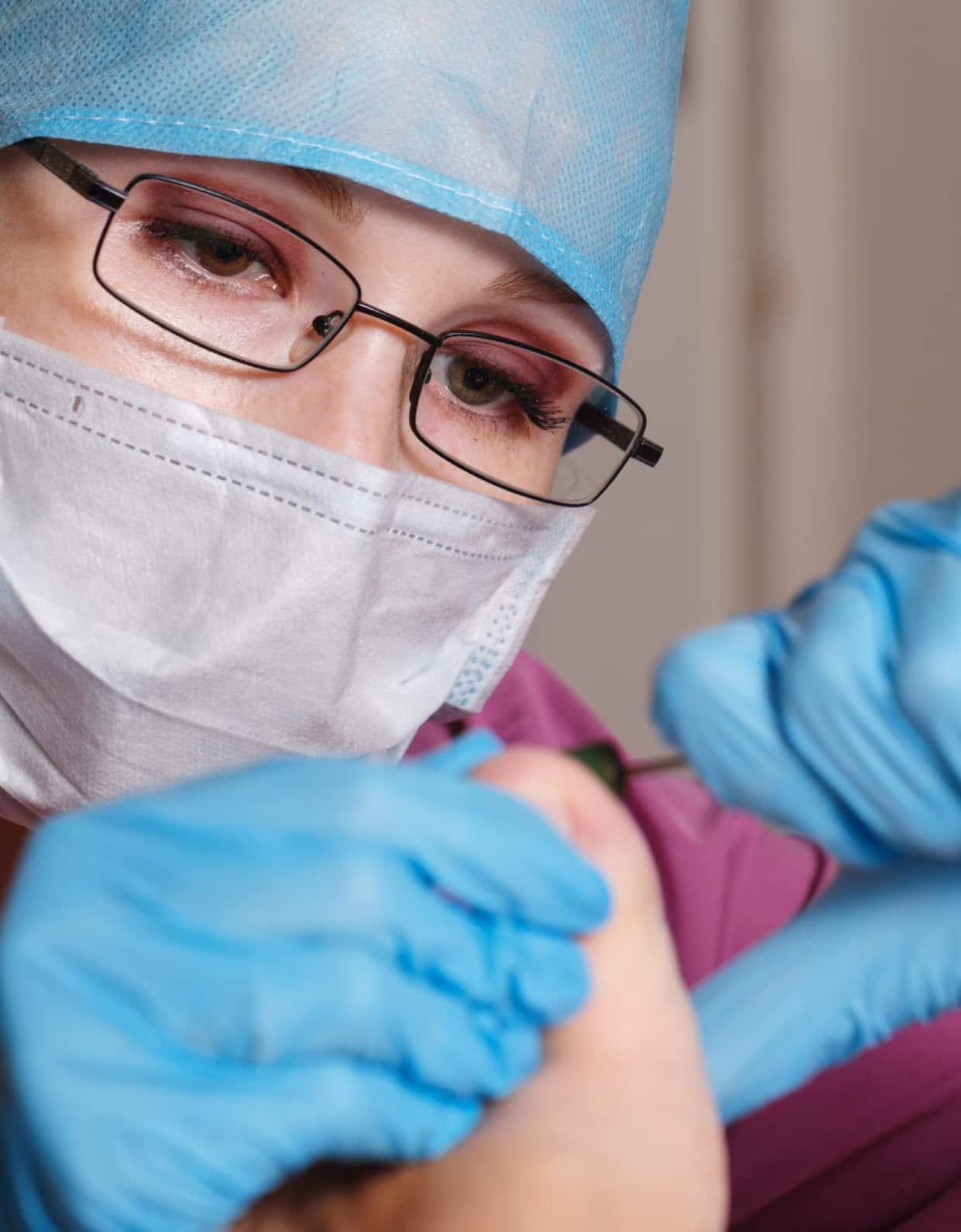Podiatry and chiropody
The Foundry Clinic offers routine foot care services for conditions such as corns, calluses, nail infections, and diabetic foot problems. Nail surgery, verrucae and foot wart treatment, and verruca needling are also available. The services include an assessment of foot health and medical history, gentle removal of hard skin and corns, nail trimming and filing, and individualised treatment.
Our podiatrist provides general foot care including nail trimming and hard skin removal and also specialises in the diagnosis and treatment of verruca, nail infections, ingrowing toenails, and painful bunions.

What to expect?
Health assessment
During a podiatry appointment, a foot health assessment is conducted to identify any underlying problems, review medical history and medication, and assess foot function and mobility. Specialised equipment may be used to diagnose and treat conditions, providing individualised care for each patient.
Medical review
A full review of medical history and medication is conducted to assess foot health, identify potential risks or complications, and ensure the treatment plan is safe and effective. Our podiatrist will ask about medical history, current medications, and any allergies.
Procedure
Hard skin removal is performed during the appointment to alleviate discomfort and improve foot health. Our podiatrist will use specialised tools to gently remove the hardened skin on the feet. This process is safe and painless, and can prevent the development of more serious foot conditions. The application of a foot moisturiser or a cooling foot spray is added if required.
Ingrown toenails and nail surgery
When toenails have a tendency to curl from one side to the other or have developed a spike they can cause excruciating pain and lead to severe infection.
Ingrowing toenails is not a serious condition but it can be extremely painful if not taken care of correctly.
Ingrowing toenails is not a serious condition but it can be extremely painful if not taken care of correctly.
Benefits of Toenail Surgery at the Foundry
- We can carry out a minor procedure known as nail surgery to remove ingrown toenails.
- During the surgery, we remove part or the entire toenail. We then apply a chemical called Phenol to the root of the nail to prevent the nail regrowing and causing further pain.
- The procedure is done under a local anaesthetic, which means there is no discomfort during or immediately after the surgery. You will have the dressing reviewed in 1 week and be given instructions on how to care for your toe.
- The recovery timeframe can range from 4-6 weeks for part of the nail removed or 8-10 weeks for total nail removal.
The most common issues that may occur after nail surgery are infection, recurrence or delayed healing.
The success rate of nail surgery is 95% and there is a 5% chance of regrowth.
Verruca needling
A very efficient and fast way to eliminate verruca and warts.
Verruca needling success rate is dependent on the immune system. From the available clinical evidence and research collated it is about 70%.
Needling uses an empty sterile needle to puncture and break down the verruca. This causes a little bleeding, which activates your body’s immune system response. Once the immune system becomes aware of the virus, it starts the process of self-healing, destroying the diseased cells.
The procedure involves 3 stages:
Verruca needling success rate is dependent on the immune system. From the available clinical evidence and research collated it is about 70%.
Needling uses an empty sterile needle to puncture and break down the verruca. This causes a little bleeding, which activates your body’s immune system response. Once the immune system becomes aware of the virus, it starts the process of self-healing, destroying the diseased cells.
The procedure involves 3 stages:
Verruca needling at the Foundry
- Firstly, we give you a local anaesthesia to make your verruca and surrounding area numb before the procedure.
- Once the area to be treated is completely numb, we proceed to repeatedly puncture the verruca with a hypodermic needle. This pushes the virus into the deeper layers of the skin so that your body’s immune system can come into contact with it and start the self-healing process.
- Finally, we apply a dressing to cover the wound. This must be kept dry for at least 24 hours and you should avoid walking or driving while your foot is still under the effect of the anaesthesia.
After 48 hours showering is permitted and life can continue as normal, although you may experience minor soreness for 2-3 days post treatment.
Usually 1-2 treatments are needed to completely eradicate the verruca. Most clients don’t see a change in the skin until 16 weeks after the treatment, hence you may not see complete results for 4 months.
It is worth noting that no single treatment for verruca and warts is 100% effective, and there is no guarantee that the verruca will not return.
You can book an appointment for some podiatry and chiropody our online booking system.
Our podiatrist offers routine foot care services for conditions such as corns, calluses, nail infections, and diabetic foot problems. Nail surgery, verrucae and foot wart treatment, and verruca needling are also available. The podiatry and chiropody services include an assessment of foot health and medical history, gentle removal of hard skin and corns, nail trimming and filing, and individualised treatment.
